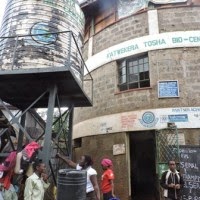A ‘tap and go’ revolution in Kibera
 In Kenya, there are approximately 2.5 million people residing
in the country’s 200
settlements. Kibera – most famous among these settlements –
is home to almost 1 million people,
making it one the biggest of slums in Africa.
In Kenya, there are approximately 2.5 million people residing
in the country’s 200
settlements. Kibera – most famous among these settlements –
is home to almost 1 million people,
making it one the biggest of slums in Africa.
Apparently, Kibera’s residents
share 600 toilets, meaning that on average, one toilet serves 1,300 people.
This has seen many residents opt
for other means of sanitation including use of what has become known as ‘flying toilets’ and putting
most people’s health at a risk.
This
has seen many
non-governmental organizations (NGOs)
trooping
to
the area to develop solutions to this problem. Among these
is Umande Trust, an NGO based
in Kibera that has developed over 25 bio-centres across
Nairobi and about 10 bio-centres across Kibera to enhance bio sanitation.
Bio sanitation is premised on the need to close the loop in the waste management process and subsequently turn waste into resources. Bio centres
apply ecological sanitation principles to ensure that
human waste in
ablution blocks are turned into wealth by producing
gas
through a bio digester
system and producing
fertilizer as a by-product.
However, the most interesting
bit about the bio centres is that residents pay for their use through the cashless system. The bio-centre premises and facilities
provide other services to the community – including
venues to screen movies and football matches for fee
as well as cooking for families – all of which are paid for via the cashless
system. Technology is highly utilized at the bio-centres as there are sensors at the entrance and
counter systems in
each toilet that provide a headcount
of everyone who accesses
the facility.
According to Umande Trust boss, Josiah Omotto, the
use of the cashless
payment system started way back “We started by
using cash payments
which became cumbersome and we were also unable
to give back to the community as we wanted. This made us decide to try using M-Pesa but still at some point we had to deal with cash where we have to move the
money to an account something we really wanted to avoid,” said Omotto. Later on, Umande
trust tried Kopo Kopo, a product which rides on the M-Pesa platform; kopokopo was introduced to several
biocenters and continues to be a success till now.
Umande trust also came up
with
a swipe card developed
by two students
from JKUAT dubbed “Bio-Card” which used the RFID technology – a
wireless non-contact use of radio frequency electromagnetic fields to transfer data, for the purposes of automatically
identifying
and tracking tags attached to objects.
The RFD tags contain electronically stored information.
The cards are still in use though they come with a challenge of being
expensive and can be easily duplicated.
That is why when BebaPay was launched
later on for use in the transport sector, Umande approached Equity and Google for a partnership in regards to cashless payment using the Beba card
which uses Near Field Communication (NFC) technology.
“Bebacard was started within some of Umande Trusts’
Sanitation facility about 12 months ago. This means that the community will never pay the caretaker cash money instead just tap the card to the
phone and the service charges are deducted and the money transfered directly to the groups account,” said Omotto.
The cards are issued freely
to
the
members of the community
and currently over 300 cards have been issued though only 50
are in
use which is a challenge as many people still opt for cash according to Omotto.
Currently, the NGO plans to
ensure that by March 2014, every
community member
uses the card and also plans to have Equity Bank agents within the bio-centre are underway as this will help the community in topping up and making
transactions.
Presently,
paying for services at the facilities using the card are Kshs 1 cheaper compared to using cash and this has seen the number of community
members embracing the cashless payment go up. Mary Achieng’
a resident at Kibera who frequently uses the facility
said that she was impressed by the move to
use digital cash, the Beba card, as it’s easy to use and enhances money safety.
“I now just have to tap and go, tap and use the bio
digester to make food for my family and also tap to get sanitation services,”
said Achieng. Once a transaction is made the card holder gets a
notification in form of a text in regards to the amount deducted and the current balance. The group members too can see transactions clearly on the dashboard, Beba phone and the group’s Gmail account.
story written by:
Lilian Mutegi



Comments
Post a Comment